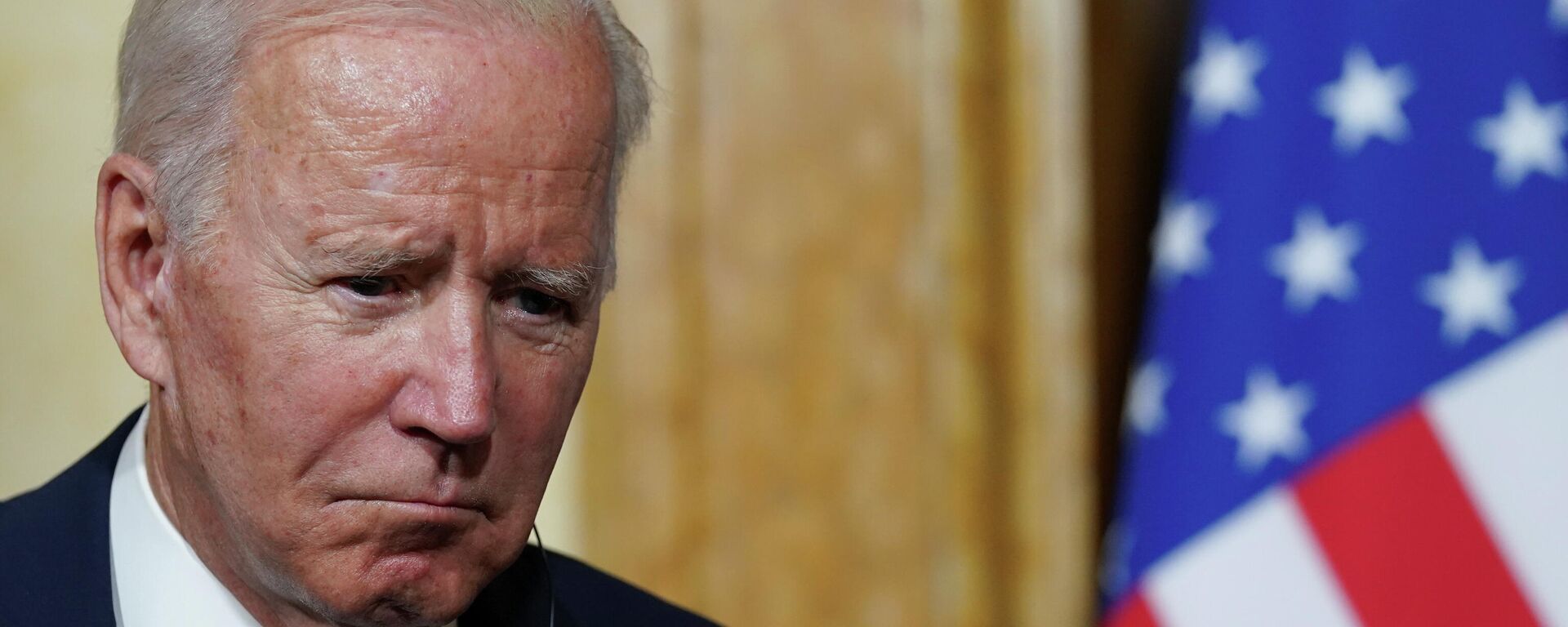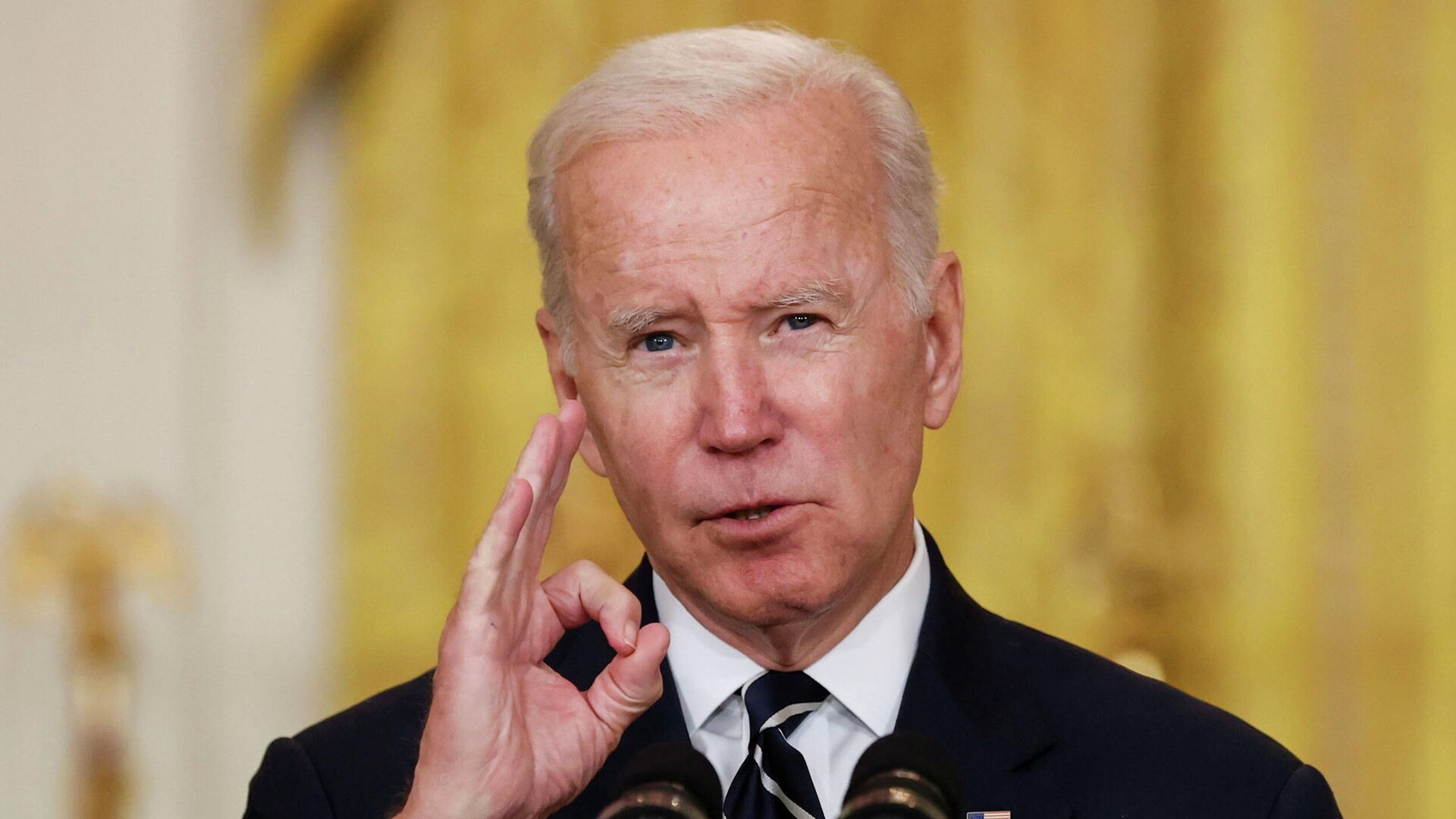https://sputnikglobe.com/20211112/bidens-spending-bill-new-survey-doubts-potus-vow-americans-earning-under-400k-wont-see-tax-hike-1090686164.html
Biden's Spending Bill: New Survey Doubts POTUS' Vow Americans Earning Under $400K Won't See Tax Hike
Biden's Spending Bill: New Survey Doubts POTUS' Vow Americans Earning Under $400K Won't See Tax Hike
Sputnik International
Earlier this month, Senator Joe Manchin and a group of Democratic House moderates signalled that they would not vote for President Biden's $1.75 trillion... 12.11.2021, Sputnik International
2021-11-12T13:25+0000
2021-11-12T13:25+0000
2022-08-06T13:26+0000
joe biden
sen. joe manchin (d-west virginia)
taxes
bill
package
infrastructure
reconciliation
build back better
us
https://cdn1.img.sputnikglobe.com/img/07e5/0b/0c/1090684617_0:30:2499:1436_1920x0_80_0_0_2799ebccd0c00dbf4c88fbead9662ab2.jpg
Provisions included in a draft version of President Joe Biden's "Build Back Better" plan may run counter to his pledge that tax hikes will only affect Americans earning $400,000 or more if the package is implemented, a new study has claimed.The social spending plan would also reduce "2022 taxes on average for every income group except those in the top 1 percent. The highest-income households would face roughly the same increase in direct taxes in 2022 as they would with all major provisions", according to the analysis.Additionally, the document found that a reconciliation bill provision that would raise the state and local tax (SALT) deduction cap "would provide almost no benefit for middle-income households" while bringing a profit to wealthy Americans.The analysis comes more than a month after Biden touted the social spending plan along with a separate bipartisan infrastructure bill during a speech in Michigan, insisting that "best of all, the cost of these bills, in terms of adding to the deficit, is zero".In a bid to unify his divided party, Biden finally had to come up with a $1.75 trillion plan instead of his original $3.5 trillion budget proposal. The trimmed down package includes preschool programmes, funding for limiting child care costs, and a continuation of the child tax credit.Moderate Senator Joe Manchin (D-WV) has urged his fellow lawmakers to wait for "greater clarity" on the legislation's impact on the country's national debt and economy. He made it clear that he would not vote for the reconciliation bill until the Congressional Budget Office (CBO) assesses the true cost of each of the package's programmes.With the CBO still in the process of weighing up the legislation, a vote on the document expected later this month.
https://sputnikglobe.com/20211108/why-bidens-build-back-better-plan-unlikely-to-save-dems-from-resounding-defeat-in-2022-1090572800.html
Sputnik International
feedback@sputniknews.com
+74956456601
MIA „Rossiya Segodnya“
2021
Oleg Burunov
https://cdn1.img.sputnikglobe.com/img/07e4/09/0b/1080424846_0:0:2048:2048_100x100_80_0_0_3d7b461f8a98586fa3fe739930816aea.jpg
Oleg Burunov
https://cdn1.img.sputnikglobe.com/img/07e4/09/0b/1080424846_0:0:2048:2048_100x100_80_0_0_3d7b461f8a98586fa3fe739930816aea.jpg
News
en_EN
Sputnik International
feedback@sputniknews.com
+74956456601
MIA „Rossiya Segodnya“
Sputnik International
feedback@sputniknews.com
+74956456601
MIA „Rossiya Segodnya“
Oleg Burunov
https://cdn1.img.sputnikglobe.com/img/07e4/09/0b/1080424846_0:0:2048:2048_100x100_80_0_0_3d7b461f8a98586fa3fe739930816aea.jpg
joe biden, sen. joe manchin (d-west virginia), taxes, bill, package, infrastructure, reconciliation, build back better, us
joe biden, sen. joe manchin (d-west virginia), taxes, bill, package, infrastructure, reconciliation, build back better, us
Biden's Spending Bill: New Survey Doubts POTUS' Vow Americans Earning Under $400K Won't See Tax Hike
13:25 GMT 12.11.2021 (Updated: 13:26 GMT 06.08.2022) Earlier this month, Senator Joe Manchin and a group of Democratic House moderates signalled that they would not vote for President Biden's $1.75 trillion reconciliation bill until the Congressional Budget Office assesses the true cost of each of the package's programmes, as well as the tax plans to fund them.
Provisions included in a draft version of President Joe Biden's
"Build Back Better" plan may run counter to his pledge that tax hikes will only affect Americans earning $400,000 or more if the package is implemented, a new study has claimed.
The survey conducted by the Washington-based think tank Tax Policy Centre argued that "taking into account all major tax provisions, roughly 20 percent to 30 percent of middle-income households would pay more in taxes in 2022".
The social spending plan would also reduce "2022 taxes on average for every income group except those in the top 1 percent. The highest-income households would face roughly the same increase in direct taxes in 2022 as they would with all major provisions", according to the analysis.
Additionally, the document found that a reconciliation bill provision that would raise the state and local tax (SALT) deduction cap "would provide almost no benefit for middle-income households" while bringing a profit to wealthy Americans.
"It would reduce their 2021 taxes by an average of only $20. Even those making between $175,000 and $250,000 would get a tax cut of just over $400 or about 0.2 percent of after-tax income. By contrast, the higher SALT cap would boost after-tax incomes by 1.2 percent for those making between about $370,000 and $870,000 (the 95th to 99th percentile)", the survey asserted.
The analysis comes more than a month after Biden touted the social spending plan along with a separate bipartisan infrastructure bill during a speech in Michigan, insisting that "best of all, the cost of these bills, in terms of adding to the deficit, is zero".
"And I made a commitment when I wrote these when I was running: No one making under $400,000 a year will see a penny in their taxes go up", POTUS said at the time.
In a bid to unify his divided party, Biden finally had to come up with a $1.75 trillion plan instead of his original $3.5 trillion budget proposal. The trimmed down package includes preschool programmes, funding for limiting child care costs, and a continuation of the child tax credit.

8 November 2021, 18:33 GMT
Moderate
Senator Joe Manchin (D-WV) has urged his fellow lawmakers to wait for "greater clarity" on the legislation's impact on the country's national debt and economy. He made it clear that he would not vote for the reconciliation bill until the Congressional Budget Office (CBO) assesses the true cost of each of the package's programmes.
With the CBO still in the process of weighing up the legislation, a vote on the document expected later this month.



